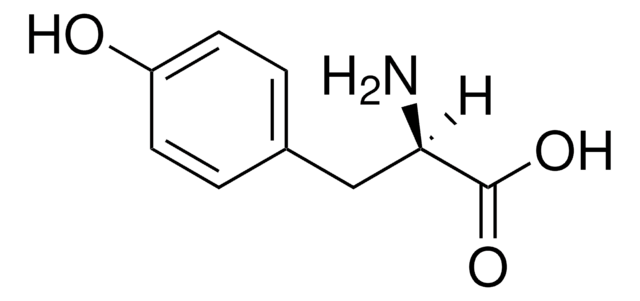W373605
L-Tyrosine
FG
Synonym(s):
(S)-2-Amino-3-(4-hydroxyphenyl)propionic acid, 3-(4-Hydroxyphenyl)-L-alanine
About This Item
Recommended Products
biological source
corn
Quality Level
grade
FG
reg. compliance
EU Regulation 1334/2008 & 872/2012
FDA 21 CFR 173.65
optical activity
[α]20/D −10.6°, c = 4 in 1 M HCl
mp
>300 °C (dec.) (lit.)
solubility
water: soluble 0.479 g/L at 25 °C
application(s)
flavors and fragrances
food allergen
no known allergens
Organoleptic
odorless
SMILES string
N[C@@H](Cc1ccc(O)cc1)C(O)=O
InChI
1S/C9H11NO3/c10-8(9(12)13)5-6-1-3-7(11)4-2-6/h1-4,8,11H,5,10H2,(H,12,13)/t8-/m0/s1
InChI key
OUYCCCASQSFEME-QMMMGPOBSA-N
Looking for similar products? Visit Product Comparison Guide
General description
Other Notes
Storage Class Code
11 - Combustible Solids
WGK
WGK 1
Flash Point(F)
Not applicable
Flash Point(C)
Not applicable
Personal Protective Equipment
Choose from one of the most recent versions:
Already Own This Product?
Find documentation for the products that you have recently purchased in the Document Library.
Customers Also Viewed
Articles
Learn more about the amino acid L-Tyrosine and explore how it is used in cell culture media like MEM, DMEM, and RPMI. We offer a comprehensive portfolio of amino acid cell culture supplements and reagents.
Our team of scientists has experience in all areas of research including Life Science, Material Science, Chemical Synthesis, Chromatography, Analytical and many others.
Contact Technical Service








